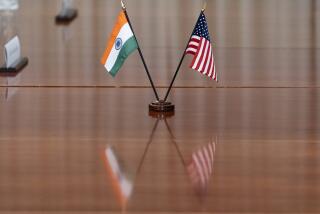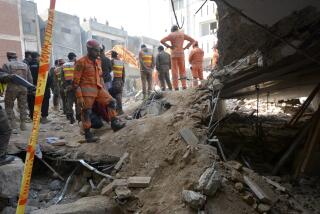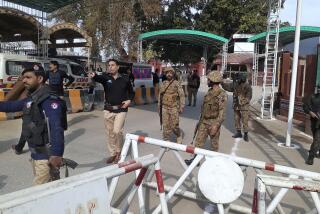Pakistan pledges to look into any militant role
MADRID AND BOSTON â As investigators focused Saturday on whether the attacks in Mumbai, India, were the work of a militant group with a history of strikes on the country, the Pakistani government pledged to investigate any evidence of involvement by extremists based on its territory.
Pakistani officials promised to look into the alleged role of ânonstate actors,â a phrase generally used to mean militant groups such as Lashkar-e-Taiba, and President Asif Ali Zardari pledged quick action against any individual or group shown to be involved.
But Foreign Minister Shah Mehmood Qureshi told reporters that India had not presented Pakistan any such proof.
U.S. and other Western investigators are supporting efforts by Indian authorities to determine the identities of the attackers, and say they have been briefed on the status of the investigation.
Indian officials said the teams of attackers that struck Wednesday night in the center of Indiaâs commerce and film industry had planned to kill 5,000 people. At least one attacker was wounded and captured.
Indian officials said the captured gunman was Pakistani. A senior Western security official, who, like others, discussed the case on condition of anonymity because of its sensitivity, said the gunman was providing leads implicating Lashkar. The group has denied involvement.
âThe anti-terrorism squad has got this guy, and theyâre getting him to spill the beans,â the security official said. âHeâs telling them a lot.â
The gunman has been tentatively identified as Ajmal Amir Kamal or Ajmal Amir Qasab from the Faridkot district of Pakistanâs Punjab province, said a person close to the investigation. The gunman and a second attacker took part in the shooting assault on a train station and hijacked a police car, setting off a chase during which police shot out the tires, pursued them as they commandeered a private vehicle, and finally cornered and shot the gunman, the Western security official said. The other attacker was killed.
Investigators suspect that a contingent of about a dozen attackers affiliated with Lashkar-e-Taiba traveled by sea from the Pakistani port city of Karachi on a merchant ship, the official said. The investigators suspect the gunmen hijacked an Indian vessel, killed three of the crew members and forced a fourth to steer them to Mumbai, where they killed him, a second Western source said. They went ashore in a rubber Zodiac boat and converged with fellow gunmen, the Western officials said.
Indian intelligence officials believe that a possible trial run occurred in March, but that Indian authorities tracked those suspects with a device placed on their commercial fishing boat, allowed them to complete the test and subsequently arrested them, the sources said.
The paramilitary-style plot reinforces suspicions of Lashkar-e-Taiba, a senior European anti-terrorism official said. Although Al Qaeda has close ties to the Pakistani group, so far the connection to this plot seems indirect at best, investigators say.
In contrast to Al Qaedaâs penchant for suicide bombings, Lashkar-e-Taiba has a history of guerrilla or paramilitary raids such as an assault on the Indian Parliament in New Delhi in 2001.
These well-planned, commando-type missions deploy gunmen who expect to die, but first execute complex tasks such as taking hostages and storming buildings. The operatives require more training than suicide bombers, who are often radicalized amateurs chosen mainly for their determination to get up close to a target and die, anti-terrorism officials said.
No Indian militant group has demonstrated the prowess of the gunmen who fended off commandos for several days in Mumbai, said Bruce Riedel, a former South Asia intelligence analyst at the CIA and the National Security Council.
âThis is much more like the capabilities weâve seen by [Lashkar-e-Taiba] and other Pakistan Kashmiri groups that have very close, long-standing links to Al Qaeda and who have been working together for a decade,â Riedel said. âIt is a dramatic demonstration that the global jihadist syndicate based in Pakistan is still as deadly as ever.â
Western and Indian intelligence officials have charged that rogue elements in Pakistani intelligence agencies have long used Lashkar-e-Taiba and other Kashmiri militant groups as proxies in their confrontation with rival India.
Experts cautioned that it is far too early to tell whether that is true in the case of the Mumbai attacks. Some discounted it, saying the new civilian government in Pakistan wants and needs to forge closer ties to India and the United States, and has purged and reined in the security forces as a result.
Zardari said Saturday that there was at least a philosophical kinship between the Mumbai attackers and Islamic militants waging a violent campaign against his government.
âThey may not be the same individuals, but they are definitely the same forces, with the same mind-set,â Zardari told Indian TV. âI am trying to save my own nation, my own country and the future of my children. So therefore, I am as committed as can be.â
Although Pakistani leaders reiterated promises to help India track down the shadowy culprits, there were signs of internal disarray. The government Saturday hastily reversed an hours-old promise to send a top intelligence official to aid in Indiaâs investigation, and said a lower-ranking official would be dispatched instead. At his news conference, Foreign Minister Qureshi appeared to backpedal even further, saying the timing of a trip by an intelligence official had not been set.
An array of Indian groups known collectively as Indian Mujahedin have been mentored and trained by veterans of Pakistani camps that are run by Lashkar-e-Taiba and other groups in a murky world of splinter factions and changing names.
Pakistani groups use English-language recruiting efforts to attract aspiring Western radicals, many of South Asian descent or converts who do not speak Arabic or Urdu. Suspects accused in plots in Britain, Canada and the United States in recent years trained at such camps.
In Mumbai, the targeting of Americans, Britons and Israelis seems to have reflected an ideological adherence to Al Qaedaâs anti-Western agenda and a desire to make a propaganda impact by striking foreigners, experts say.
But officials of Lashkar-e-Taiba, which changed its name to Jamaat ud-Dawa after Pakistan banned it, have denied involvement.
Evan F. Kohlmann, a U.S.-based expert who has worked with European and North American anti-terrorism agencies, described a phone conversation with a spokesman of the groupâs political wing who condemned the Mumbai violence as âcarnage.â
The denials must be taken in perspective because the group has also denied it has training camps despite evidence to the contrary, Kohlmann said. But he added, âLashkar was quick to deny this. It may be that the central command was not involved; maybe this was a splinter group.â
--
Times staff writers Laura King in Kabul, Afghanistan, and Mark Magnier in Mumbai and special correspondent Mubashir Zaidi in Islamabad, Pakistan, contributed to this report.
--
Josh Meyer reporting from Boston
Sebastian Rotella reporting from Madrid
More to Read
Sign up for Essential California
The most important California stories and recommendations in your inbox every morning.
You may occasionally receive promotional content from the Los Angeles Times.










